Filter by
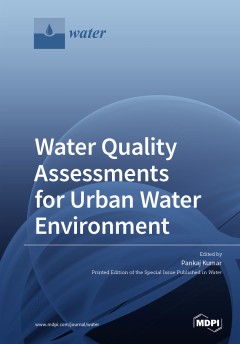
Water quality assessments for urban water environment
This special issue entitled “Water Quality Assessments for Urban Water Environment,” strives to highlights the status quo of water environment, opportunities and challenges for their sustainable management in lieu of rapid global changes (land us eland cover changes, climate change, population growth, change in socio-economic dimension, urbanization etc.), in the urban space particularly in…
- Edition
- -
- ISBN/ISSN
- 9783036518701
- Collation
- -
- Series Title
- -
- Call Number
- 333.7 KUM
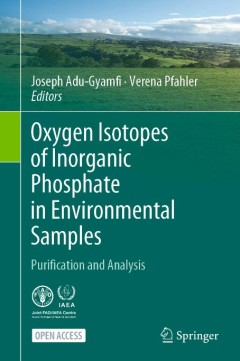
Oxygen Isotopes of Inorganic Phosphate in Environmental Samples : Purificatio…
This open access book distinguished itself from other publications by offering step-by-step instructions on how to extract, purify, provide modifications, and major issues to be encountered during the process. For the δ18OP method to progress, further fundamental research as well as field and laboratory studies need to be conducted for a better understanding of P cycling in the environment. Ch…
- Edition
- -
- ISBN/ISSN
- 9783030974978
- Collation
- vii, 64 p.
- Series Title
- -
- Call Number
- 577.14 OXY J
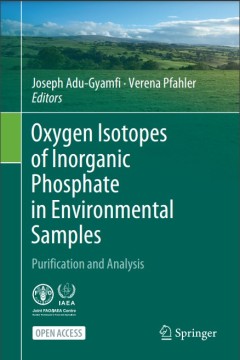
Oxygen Isotopes of Inorganic Phosphate in Environmental Samples
This open access book distinguished itself from other publications by offering step-by-step instructions on how to extract, purify, provide modifications, and major issues to be encountered during the process. For the δ18OP method to progress, further fundamental research as well as field and laboratory studies need to be conducted for a better understanding of P cycling in the environment. Ch…
- Edition
- 6
- ISBN/ISSN
- 9783030974978
- Collation
- -
- Series Title
- -
- Call Number
- 333.7 OXY J

Decolonising blue spaces in the anthropocene: freshwater management in Aotear…
This open access book crosses disciplinary boundaries to connect theories of environmental justice with Indigenous people’s experiences of freshwater management and governance. It traces the history of one freshwater crisis – the degradation of Aotearoa New Zealand’s Waipā River– to the settler-colonial acts of ecological dispossession resulting in intergenerational injustices for Indi…
- Edition
- -
- ISBN/ISSN
- 9783030610715
- Collation
- xii, 494p. : ill
- Series Title
- Palgrave Studies in Natural Resource Management
- Call Number
- 363.700993 MEG d
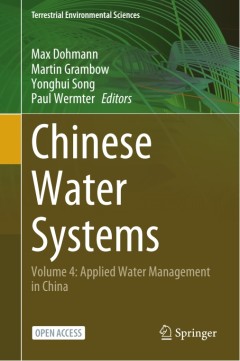
Chinese water systems : Volume 4,. Applied water management in China
This open-access book addresses latest Sino-German results of the joint research efforts within Major Water Program of the Chinese Government supported by German research funding. The Major Water Program aims at the restoration of polluted water environments and sustainable management of water resources in China. The joint BMBF-CLIENT project SINOWATER deals with three most significant and stro…
- Edition
- -
- ISBN/ISSN
- 9783030802349
- Collation
- xvi, 281p. : ill.
- Series Title
- -
- Call Number
- 333.73 CHI c
Water-wise cities and sustainable water systems: concepts, technologies and a…
Building water-wise cities is a pressing need nowadays in both developed and developing countries. This is mainly due to the limitation of the available water resources and aging infrastructure to meet the needs of adapting to social and environmental changes and for urban liveability. This is the first book to provide comprehensive insights into theoretical, systematic, and engineering aspects…
- Edition
- -
- ISBN/ISSN
- 9781789060768
- Collation
- xx, 453p.: ill.
- Series Title
- -
- Call Number
- 628.1 WAT w
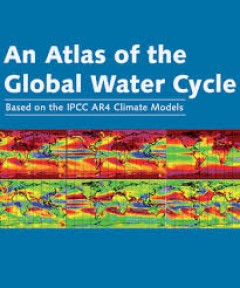
An Atlas on global water cycle
What do climate models predict for the rainfall where you live? What about evaporation or runoff? Should your local community consider constructing new dams or do the existing water storages appear adequate? What about the availability of water for irrigation farming? Do the predictions differ between different climate models or do all the models basically predict the same changes in water avai…
- Edition
- -
- ISBN/ISSN
- 9781921536892
- Collation
- -
- Series Title
- -
- Call Number
- 551.5773 ROD a
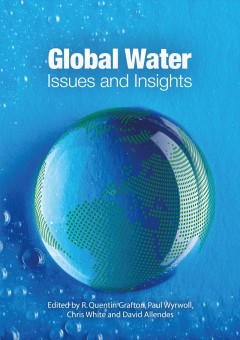
Global water : issues and insights
This book brings together some of the world’s leading water researchers with an especially written collection of chapters on: water economics; transboundary water; water and development; water and energy; and water concepts.
- Edition
- -
- ISBN/ISSN
- 9781925021677
- Collation
- 239p. : ill.
- Series Title
- -
- Call Number
- 333.9100994 GLO g
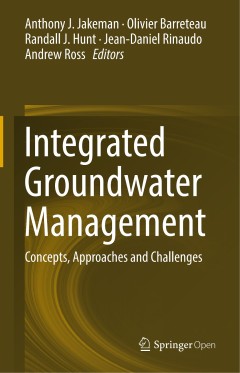
Integrated groundwater management : concepts, approaches and challenges
The aim of this book is to document for the first time the dimensions and requirements of effective integrated groundwater management (IGM). Groundwater management is a formidable challenge, one that remains one of humanity’s foremost priorities. It has become a largely non-renewable resource that is overexploited in many parts of the world. In the 21st century, the issue moves from how to si…
- Edition
- -
- ISBN/ISSN
- 9783319235769
- Collation
- xiii, 762p. : ill.
- Series Title
- -
- Call Number
- 628.114 INT i
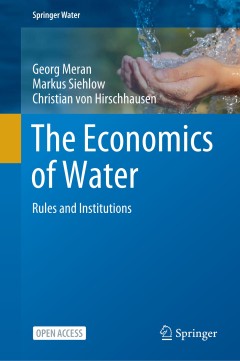
The economics of water : rules and institutions
This open access textbook provides a concise introduction to economic approaches and mathematical methods for the study of water allocation and distribution problems. Written in an accessible and straightforward style, it discusses and analyzes central issues in integrated water resource management, water tariffs, water markets, and transboundary water management. By illustrating the interplay …
- Edition
- -
- ISBN/ISSN
- 9783030484859
- Collation
- xvii, 301p. : ill.
- Series Title
- -
- Call Number
- 333.91 MER e
 Computer Science, Information & General Works
Computer Science, Information & General Works  Philosophy & Psychology
Philosophy & Psychology  Religion
Religion  Social Sciences
Social Sciences  Language
Language  Pure Science
Pure Science  Applied Sciences
Applied Sciences  Art & Recreation
Art & Recreation  Literature
Literature  History & Geography
History & Geography